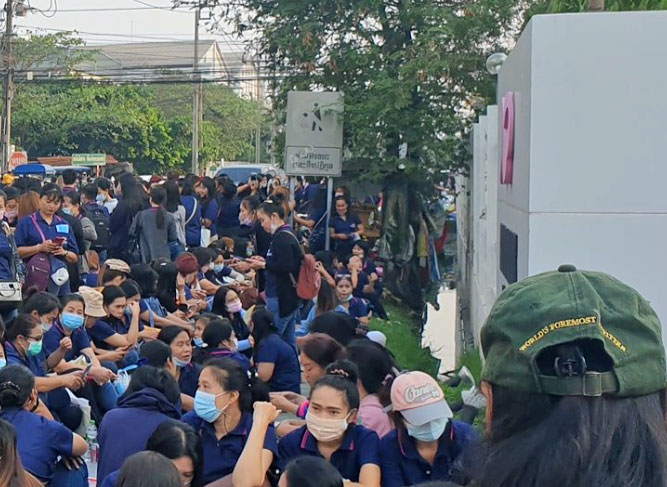
Decent Wages, Safe Jobs through Solidarity Center NED Funding
Funding by the National Endowment for Democracy (NED) has enabled the Solidarity Center to provide workers around the globe with the tools they need to achieve decent wages and safe working conditions by strengthening their ability to engage in such democratic practices as the ability to freely speak out, form unions and associations and shape the futures for them and their communities.
Through NED’s high-impact democracy investments, the Solidarity Center is bringing about its core belief that when working people have the freedom and tools to join together in unions and associations, bargain with employers and steer their own course, they will build more just, inclusive and democratic societies.
As part of NED’s founding in 1983 as a bipartisan, nonprofit foundation, Solidarity Center has transformed millions of lives in dozens of countries:
- Enabling working people to improve access to health care in Nigeria, where the government provided nearly $70 million to bolster the country’s health infrastructure following a Solidarity Center effort advocating increased public spending on health care and boosting health care workers’ wages and working conditions;
- Building power with more than 1,000 workers cutting and harvesting sugar cane in the Dominican Republic to secure decent wages and living conditions and safety at work by exercising their democratic freedoms;
- Improving health and safety at more than 1,000 worksites in Serbia through training and support, which also enabled workers to collaborate with the government and the Serbian Association of Employers to address safety and workplace health hazards.
- In Thailand, where NED funding has enabled Solidarity Center to improve conditions for workers making garments and electronics in supply chain factories, Solidarity Center efforts assist workers in their efforts to collect unpaid wages, such as at the Brilliant Alliance Thailand (BAT).
“With the support of Solidarity Center, which negotiated directly with the multinational company (the customer of BAT), 1,250 workers won back $8.3 million in wages and severance payments owed to us,” said former garment worker, Teuanjai Waengkham.
The Philippines, Central Asia, Morocco and the Maldives provide more glimpses into NED-supported Solidarity Center efforts to strengthen a new generation of advocates for workers’ fundamental rights, and improve wages and job safety that often expand to nonunion workers and entire communities.
Fair Wages in the Philippines
Across the Philippines, workers are frequently not paid what they are owed. Bolstered by the Solidarity Center, many are now exercising their democratic rights to advocate for—and receive—fair pay.
Funded by NED, Solidarity Center efforts led to a recent ruling granting 7.2 million PHP ($128,000) in lost wages for digital platform drivers for FoodPanda in Cebu. As they joined together in their new union, RIDERS-SENTRO, the drivers could connect with local governments to press their concerns and make their voices heard in a fragile democracy.
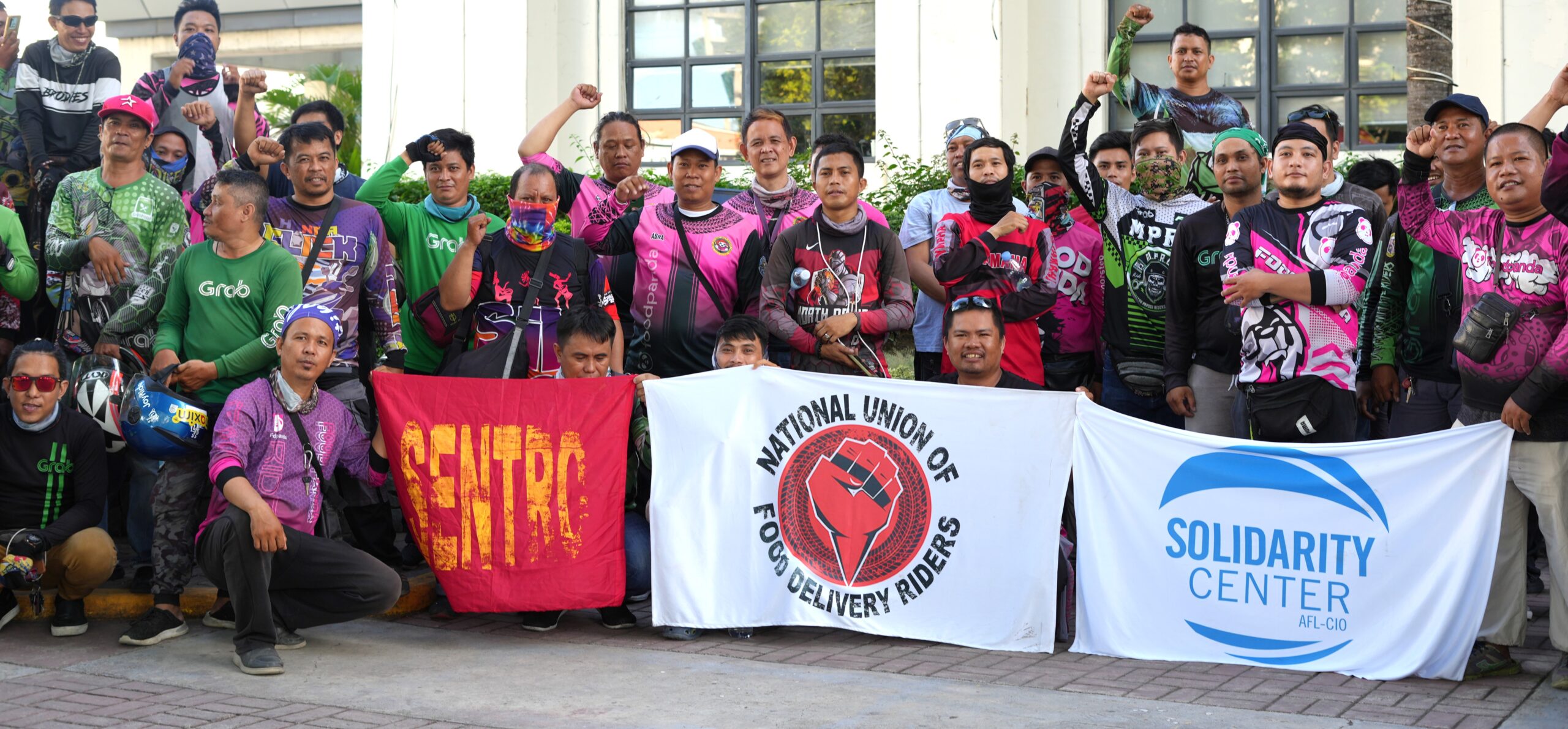
Food delivery riders improved pay at FoodPanda in Cebu, Philippines, part of platform workers’ efforts to assert their rights, protect their lives and improve working conditions.
across the globe.
FoodPanda is appealing the ruling, but the drivers say that with a union, they are confident of their ability to win their rights on the job. When working people have the freedom and tools to organize, bargain and lead, they will build more just, inclusive, and democratic societies.
“Because of the union, we have the fighting spirit for this,” says Abraham Monticalbo, Jr., a RIDERS-SENTRO member. Delivery drivers empowered to achieve decent wages boost their living conditions—and that of their family.
“We realize our power, our rights.”
Forging a New Generation of Workers in Central Asia
Many young people finish school or college and start jobs without knowing their legal rights at work, or how to identify workplace practices that reflect corruption.
In Central Asia, where the Solidarity Center hosts a Regional Youth School, multi-day workshops raise awareness about workplace violations, while empowering young people, as key agents of change, to stand up for worker rights, challenge corruption and take initiative in their communities.
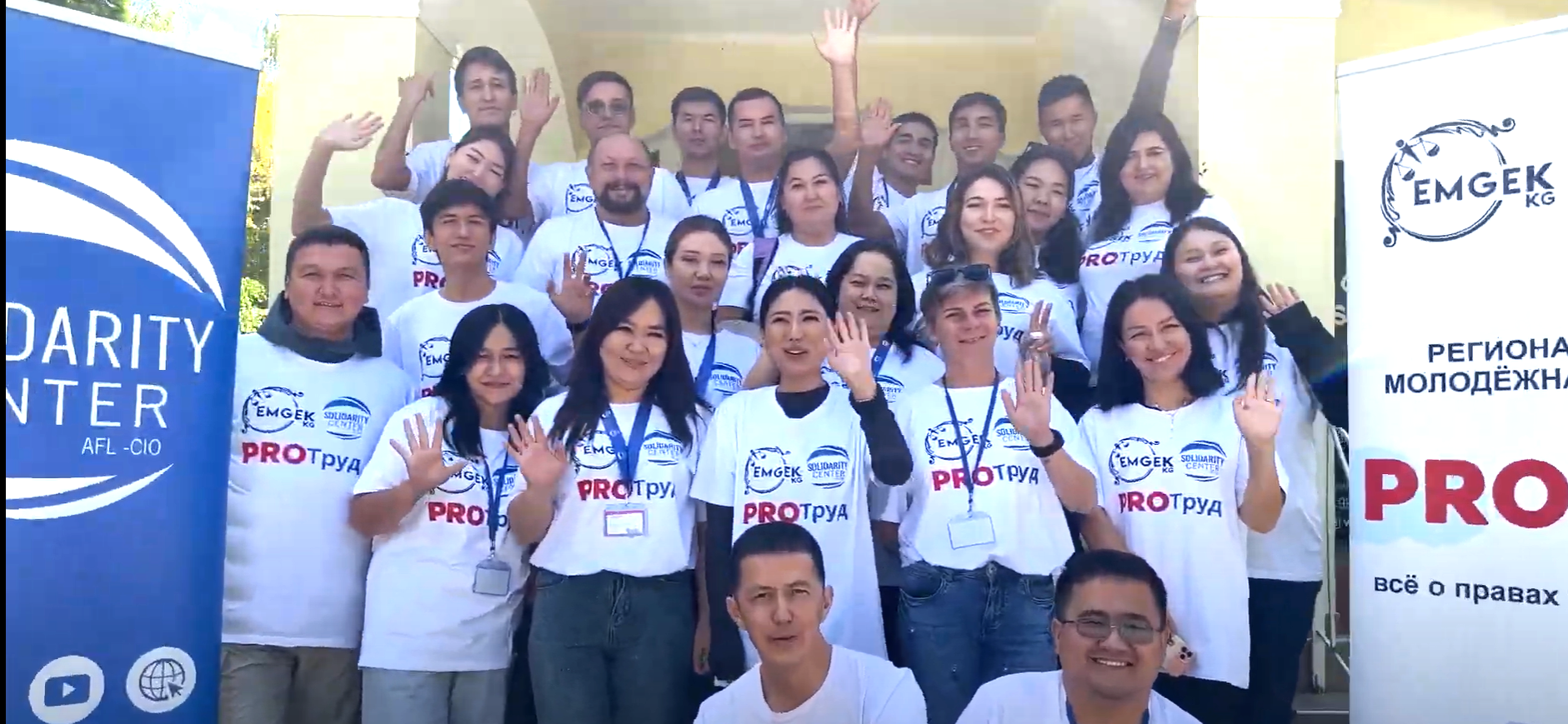
Participants from Kazakhstan, Kyrgyzstan and Uzbekistan took part in a regionwide leadership seminar to increase labor strategies for battling corruption. Credit: Solidarity Center
“We learned how to protect labor rights, how to fight [workplace] corruption,” Salamabekova Meerim, a member of the trade union of medical workers in Kyrgyzstan, said about a recent workshop. “These lessons give us valuable tools to improve our lives and strive for better conditions.”
In a recent three-day NED-funded workshop, 18 young leaders from Kazakhstan, Kyrgyzstan and Uzbekistan from areas such as health care and mining, engaged in interactive learning that combined professional input with participatory exercises, blending lectures with gamified elements, such as role-playing and interactive tools.
Participants said they plan to hold peer-to-peer training sessions on labor rights and workplace corruption in their countries, countries.
By creating a strong framework—expanding young workers’ ability to turn their ideas into action—the Solidarity Center continues its bottom-up, partnership approach, one that results in permanent, lasting change.
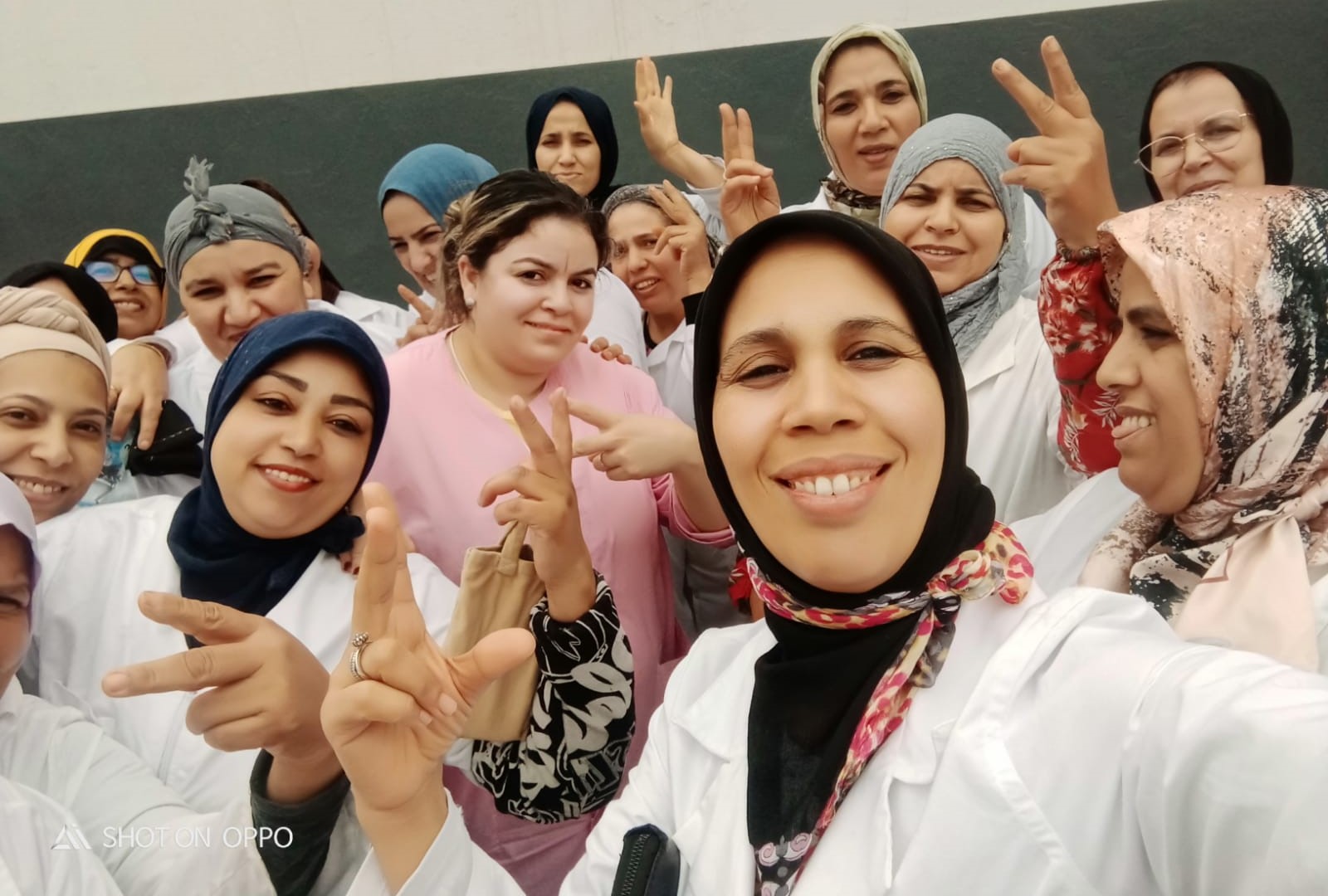
Nearly 2,000 workers at textile factories in Casablanca, Morocco, now can receive decent pay, health care protection and a voice on the job after joining UMT. Credit: Solidarity Center / Hicham Ahmaddouh
Morocco Textile Workers Win Dignity, Decent Work
For the nearly 2,000 workers at seven textile factories in Casablanca, Morocco, forming a union enabled them to receive decent pay, health care protection and a voice on the job. Joining together also meant achieving success when exercising democracy.
“We joined the union primarily to preserve our dignity, which some managers have trampled on,” said one worker, who voted for the union. (Names are not used to protect workers’ privacy.)
In November, the workers formed unions through the Moroccan Workers’ Union (UMT) and the federation of textile workers. Addressing unsafe and unhealthy working conditions was critical in the factories, where they are involved in leather production, sewing, dyeing and garment manufacturing.
They also sought fair wages—workers often were not paid, and received insufficient compensation when frequently required to work overtime—or engaged in fewer hours than specified by the government.
As in countries worldwide, the Solidarity Center teamed up with union partners, in addition to connecting directly with working people to best achieve worker rights. Solidarity Center’s NED-funded strategy not only enabled textile workers to practice their democratic rights to form unions and improve working conditions, but the efforts also are essential for expanding Solidarity Center’s efforts to broaden worker rights for all of society.
Assisting textile workers in forming unions moves forward their ability to achieve decent wages, safe workplaces and essential health care coverage—and advances their democratic rights to exercise freedom of association, organizing and more.
Without a union, said one worker, “we couldn’t find solutions to our issues or secure our legal rights, which the company has neglected for more than five years.
“We achieved dignity and the freedom to associate, which was previously denied.”
“The Solidarity Center played a critical role in the success of the campaign within the textile sector,” said Al-Arabi Hamouk, general secretary of the National Federation of Textile, Leather and Ready-Made Garment Workers. “The organizing team demonstrated the ability to strategize and address challenges.”
Ending Unpaid Labor, Boosting Job Safety & Health
Nurses and other medical professionals provide patients with crucial support—administering medications, monitoring vital signs, caring for people in hospital beds and more. But in the Maldives, nurses often worked between 40 and 60 hours of overtime each month—all with no pay. Through NED-funded Solidarity Center support and assistance, 9,000 nurses across the Maldives will now receive overtime pay in full when assigned extra hours of work during public holidays.
“This is a great win for the union workers. Our rights have been neglected for so long, but we have come so far through our work within the union,” says Shifana Ali, a medical laboratory assistant and active participant in the campaign.
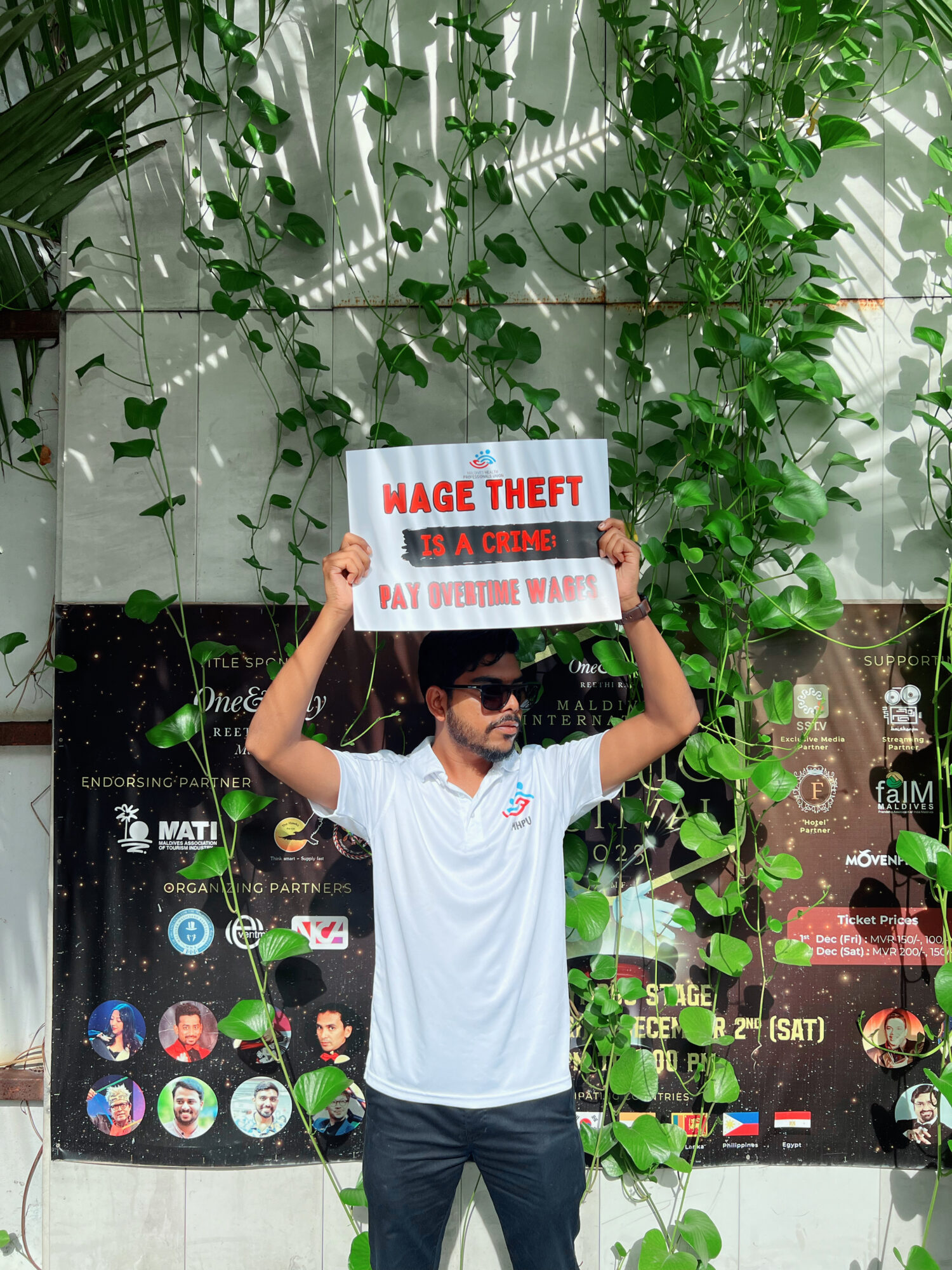
A health care worker holds a sign stating: “Wage theft is a crime–Pay overtime wages.” Credit: MHPU
The Solidarity Center collaborated with its partner, the Maldives Health Professionals Union (MHPU), on a robust campaign to advocate for legislative amendment, which was approved at the end of March and applies to all government healthcare workers.
In doing so, the Solidarity Center moved forward its core principle that when working people have the freedom and tools to organize, bargain and lead, they have the tools to build more just, inclusive and democratic societies. In facing the challenges confronting them, nurses in the Maldives could shape the policies and laws that truly make change for everyone by extending their voice and power through their union.
The Solidarity Center played a vital role in providing training and technical assistance to partner unions, including MHPU. The successful overtime campaign reflects the strategies the union gained, and its new focus facilitated workers in building grassroots, structured organizing efforts focused on strategies that educate and mobilize workers to build collective power.
“We want to ensure that all workers are safeguarded against unpaid forced labor, as it directly impacts both patient care and life beyond work of the individual,” says Fatimath Zimna, MHPU general secretary.
“The Solidarity Center was a huge partner in the campaign in passing two very crucial [pieces of] legislation,” Zimna says.
Achieving nurse overtime pay continued NED-funded Solidarity Center efforts with the Maldives Trade Union Congress (MTUC) and MHPU to improve job safety and health and the legally guaranteed democratic worker rights, such as the freedom to form unions and take part in peaceful protests.
The Solidarity Center worked closely with the unions throughout much of the decade-long campaign for job safety and health, providing mobilizing and technical training and assisting in the drafting process. Its passage goes a long way toward protecting workers’ rights, says Zimna, and highlights the importance of workers joining together in unions to improve working conditions that also benefit the community.
“It is important for workers to organize into unions and raise their voices collectively to protect workers’ interests to fully entertain the rights given by the two acts.”

